|
|
|
Sort Order |
|
|
|
Items / Page
|
|
|
|
|
|
|
| Srl | Item |
| 1 |
ID:
153234
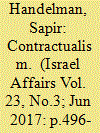

|
|
|
|
|
| Summary/Abstract |
How do we create an effective change in situations of intractable conflict where ordinary people are at the centre of the struggle? Distinguishing between top-down contractualism and bottom-up contractualism, this article presents the South African peace process of the 1990s as an example of top-down contractualism. In contrast, it raises the question as to whether bottom-up peace-making contractualism can emerge in the Israeli–Palestinian case.
|
|
|
|
|
|
|
|
|
|
|
|
|
|
|
|
| 2 |
ID:
083750
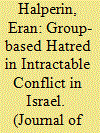

|
|
|
|
|
| Publication |
2008.
|
| Summary/Abstract |
Countless theoretical texts have been written regarding the centrality of hatred as a force that motivates intergroup conflicts. However, surprisingly, at present, almost no empirical study has been conducted either on the nature and character of group-based hatred or on its implications for conflicts. Therefore, the goal of the current work has been to examine the nature of group-based hatred in conflicts. Three studies were conducted within the context of the Israeli-Palestinian conflict. The first was a qualitative study, which aimed at creating a preliminary platform for investigation of specific features of group-based hatred. Studies 2 and 3 used various scenarios and survey methods to indicate the appraisal and the behavioral aspects of group-based hatred and to distill them from those of other negative emotions, such as anger or fear. In general, results show that hatred is a distinct emotion that includes a unique cognitive-appraisal component and specific emotional goals.
|
|
|
|
|
|
|
|
|
|
|
|
|
|
|
|
| 3 |
ID:
184709


|
|
|
|
|
| Summary/Abstract |
This study examines the fundamental causes of intractable conflict and deadlocked negotiation by centering on identity. The cognitive variables of identity are derived, and the causal layered analysis framework is used to analyze the influencing mechanism among cognitive layers. This research assumes that conflicts are influenced by interactions among key variables of the identity frame in the cognitive layer: “ingroup definition,” “outgroup definition,” and “conflict narrative.” The United States–North Korea denuclearization negotiation case is examined using this framework, seeking to understand how these factors influenced the conflict, policy initiatives and negotiations.
|
|
|
|
|
|
|
|
|
|
|
|
|
|
|
|
| 4 |
ID:
099821


|
|
|
|
|
| Publication |
2010.
|
| Summary/Abstract |
The Minds of Peace Experiment is a simulation of a potential Palestinian-Israeli public assembly. The assembly is a major public negotiating congress that invites delegations from all walks of life to discuss, debate, and negotiate solutions for the Palestinian-Israeli conflict. It is an important peacemaking tool that, together with other channels of peacemaking, can create the conditions for a peaceful resolution of the conflict. This article introduces the Minds of Peace Experiment and its practical implications. It includes theoretical background, a vision for an effective peace process and lessons from the first two rounds of the experiment which were conducted at the University of Missouri-St. Louis. The question is: How can this peacemaking effect be transformed into a mass movement that can culminate in the establishment of a major Palestinian-Israeli Public Negotiating Congress?
|
|
|
|
|
|
|
|
|
|
|
|
|
|
|
|
| 5 |
ID:
153233
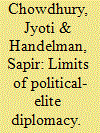

|
|
|
|
|
| Summary/Abstract |
This article challenges the convention that political-elite diplomacy should be the main instrument for coping with difficult violent conflicts. Its main argument is that a multifaceted approach to peace-making that creates equilibrium between political-elite diplomacy and public diplomacy has the greatest potential to generate a positive change in difficult situations of protracted violent conflicts where ordinary citizens are at the centre of the struggle. To demonstrate our central claim, the paper analyses three case studies that are considered to be significant cases within the realm of geopolitics and the history of modern statecraft: the Oslo Accord in the Israeli–Palestinian situation, the Dhaka negotiations that preceded the civil war between East and West Pakistan, and the Mandela–de Klerk interactions that led to a revolutionary transformation in South Africa.
|
|
|
|
|
|
|
|
|
|
|
|
|
|
|
|
| 6 |
ID:
128303
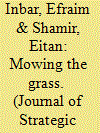

|
|
|
|
|
| Publication |
2014.
|
| Summary/Abstract |
'Mowing the Grass', Israel's strategy in the twenty-first century against hostile non-state groups, reflects the assumption that Israel finds itself in a protracted intractable conflict. The use of force in such a conflict is not intended to attain impossible political goals, but a strategy of attrition designed primarily to debilitate the enemy capabilities. Only after showing much restraint in its military responses does Israel act forcefully to destroy the capabilities of its foes, hoping that occasional large-scale operations also have a temporary deterrent effect in order to create periods of quiet along its borders. The Israeli approach is substantively different from the current Western strategic thinking on dealing with non-state military challenges.
|
|
|
|
|
|
|
|
|
|
|
|
|
|
|
|
| 7 |
ID:
092053


|
|
|
|
|
| Publication |
2009.
|
| Summary/Abstract |
One of the most important psychological barriers to conflict resolution is the rigid structure of the sociopsychological repertoire that evolves in societies immersed in intractable conflict. This article examines ways to overcome the rigidity of this repertoire in the context of the Israeli-Palestinian conflict. Specifically, in line with the prospect theory, the authors assumed that elicitation of beliefs about losses stemming from the continuing conflict may bring about a process of "unfreezing." To test this assumption, an exploratory study with a national sample of the Israeli-Jewish population and two subsequent experimental studies were conducted. The results demonstrated that exposure to information about losses inherent in continuing the conflict induces higher willingness to acquire new information about possible solutions to the conflict, higher willingness to reevaluate current positions about it, and more support for compromises than the exposure to neutral information or to information about possible gains derived from the peace agreement.
|
|
|
|
|
|
|
|
|
|
|
|
|
|
|
|
| 8 |
ID:
143661
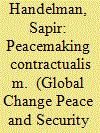

|
|
|
|
|
| Summary/Abstract |
This paper presents a contractual approach to coping with difficult situations of intractable conflict where ordinary citizens are at the center of the struggle. The contractualist peacemaker challenge is to convert conflicting parties into a peacemaking community committed to resolving the conflict by peaceful means. Three main elements are necessary to transform conflicting groups into a peacemaking community: common interest: strong desire to resolve the conflict by peaceful means; rules: commitment to democratic principles of dialogue; and peacemaking institutions: an organizational device that operates and maintains peacemaking communities. A peacemaking institution that has the potential to create momentum for the establishment of a peacemaking community is a major public negotiating congress. An ideal congress invites delegations from all walks of life to negotiate solutions to the conflict. This vision is based on the multi-party talks of the 1990s that helped to create a major change in two difficult situations of intractable conflict: the ‘troubles' in Northern Ireland and the battle against the Apartheid system in South Africa. This paper explores possibilities to establish a major Israeli–Palestinian public negotiating congress.
|
|
|
|
|
|
|
|
|
|
|
|
|
|
|
|
| 9 |
ID:
129046


|
|
|
|
|
| Publication |
2014.
|
| Summary/Abstract |
This article presents a contractualist approach to peace and conflict studies that grows out of classical paradigms in the field. The contractualist approach proposes a solution to intractable conflicts through processes such as a public negotiating congress to transform conflicting parties into a large peacemaking community. The vision of an ideal congress is based on the multi-party talks that had operated in South Africa and Northern Ireland during the 1990s. The challenge is to establish a similar peacemaking institution in cases such as the Israeli-Palestinian dispute where ordinary citizens are at the center of the struggle. This article includes theoretical background, analysis of relevant case studies, and lessons from the Minds of Peace Experiment, a small-scale Israeli-Palestinian public negotiating congress that has held sessions in various locations around the world.
|
|
|
|
|
|
|
|
|
|
|
|
|
|
|
|
| 10 |
ID:
153232


|
|
|
|
|
| Summary/Abstract |
This introductory article describes peace-making, peace-building and peace-keeping according to the specific characterization of the Israeli–Palestinian conflict. It presents the different articles in this special issue according to these categories and discusses critically their main theses. This methodology intends to help us gain a better understanding of the challenge of change.
|
|
|
|
|
|
|
|
|
|
|
|
|
|
|
|
| 11 |
ID:
137639
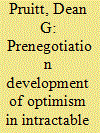

|
|
|
|
|
| Summary/Abstract |
Except when there is substantial third-party pressure for settlement, participants in intractable conflict will only enter negotiation if they are motivated to end the conflict and optimistic about negotiation’s chances of success. The sources of such optimism are explored using case material from three intractable interethnic conflicts that were ultimately resolved by negotiation. In all three cases, optimism developed during prenegotiation communication between the parties. Also there were two main channels of communication, each channel providing credibility to the other and serving as a back-up if the other failed. In two of the cases the communication was face-to-face and friendly, but in the third it was distant and mediated by a chain of two intermediaries. A possible reason for this difference is that the parties were positively interdependent in the first two cases but not in the third. The paper concludes with a summary of three psychological experiments that demonstrate the impact of positive vs. negative interdependence.
|
|
|
|
|
|
|
|
|
|
|
|
|
|
|
|
| 12 |
ID:
159859
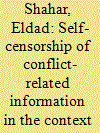

|
|
|
|
|
| Summary/Abstract |
Self-censorship is of great importance in societies involved in intractable conflict. In this context, it blocks information that may contradict the dominant conflict-supporting narratives. Thus, self-censorship often serves as an effective societal mechanism that prevents free flow and transparency of information regarding the conflict and therefore can be seen as a barrier for a peacemaking process. In an attempt to understand the potential effect of different factors on participants’ willingness to self-censor (WSC) conflict-related information, we conducted three experimental studies in the context of the Israeli–Palestinian conflict. Study 1 revealed that perception of distance from potential information recipients and their disseminating capabilities lead to higher WSC. Study 2 replicated these results and also showed that fulfilling different social roles has an effect on the WSC. Finally, study 3 revealed that the type of information has a major effect on WSC.
|
|
|
|
|
|
|
|
|
|
|
|
|
|
|
|
| 13 |
ID:
134157
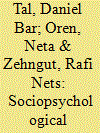

|
|
|
|
|
| Publication |
2014.
|
| Summary/Abstract |
Societies involved in intractable conflicts form conflict-supporting narratives that illuminate and justify their intergroup conflicts. These narratives play an important role in satisfying the basic sociopsychological needs of the involved individuals and collectives. In order to fulfill this role the narratives tend to be biased in favor of the in-group, selective, distorting and simplistic. This article analyzes such narratives that focus on the following major themes: Justification and Threats (of conflict), Delegitimization (of the opponent), Glorification and Victimhood (of the in-group), the in-group's need for Patriotism and Unity, and its Aspiration for Peace. Additionally, the article describes the individual and collective functions of these narratives. It also describes six main methods that are used in the narratives' construction: reliance on supportive sources, marginalization of contradictory information, magnification of supportive themes, fabrication of supportive contents, omission of contradictory contents, and use of framing language. Because conflict-supporting narratives are so functional, the involved societies struggle to support their dominance within their own society as well as in the international community. This article, therefore, presents seven methods that are used by the parties in their intrasocietal struggles - control of access to information, censorship, discrediting of contradicting information, monitoring, punishment, encouragement and rewarding, and closure of archives. Similar methods are used in the international arena struggles. Finally, it describes the process of change from adherence to the conflict-supportive narratives to the construction of new peace-supporting narratives and Adherence to Them.
|
|
|
|
|
|
|
|
|
|
|
|
|
|
|
|
| 14 |
ID:
098446
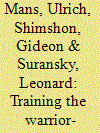

|
|
|
|
|
| Publication |
2010.
|
| Summary/Abstract |
Despite the wealth of experience among simulation scholars, there is still little consensus on how to link gaming attributes to specific learning objectives. This article aims to contribute to this discussion and argues that specific simulation design can lead to reaching pre-defined learning objectives. The authors present a teaching project developed and executed for the Netherlands Defense Academy, how it was set up in 2005, and the way it evolved over time. The authors discuss how the methodology fits into the academic debate on the strengths of experiential learning. The simulation methodology used is rooted in experiential learning and typically supports standard learning goals and styles. When dealing with a specific target group, it is possible to pinpoint one specific, overarching learning objective. This allows trainers to link each individual aspect of the simulation design to that particular learning goal and, in turn, provides a valuable framework to develop, run and evaluate simulation exercises. The authors discuss how two innovative elements in simulating gaming can help to make such an approach work: combining closed and open scenarios, and new communication software that allows for continuous supervision during the game. The conclusions discuss how students respond to the challenges during the game and what the data from debriefings tells us about the methodology's learning appeal for a military target group.
|
|
|
|
|
|
|
|
|
|
|
|
|
|
|
|
|
|
|
|
|